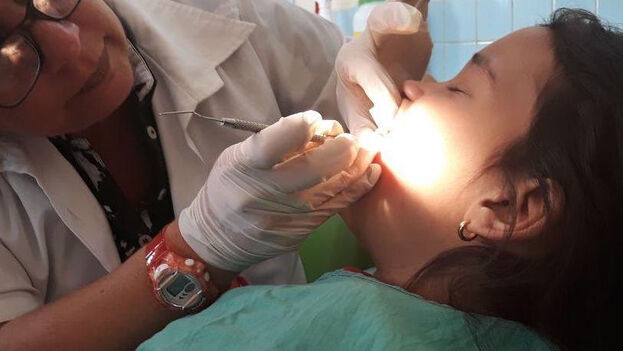
![]() 14ymedio, Yoani Sanchez, Generation Y, Havana, 29 January 2021 — Ana Laura is not her name but telling her story with her real identity would lead to incalculable problems, so better to be cautious. The living room of her house is nothing more than a domestic decoration to camouflage the small dental clinic she has in the next room. Passing the cat, the grandmother, and the family sofa, we emerge into a gleaming room, with a poster promoting good tooth brushing and an armchair with everything she needs to care for patients.
14ymedio, Yoani Sanchez, Generation Y, Havana, 29 January 2021 — Ana Laura is not her name but telling her story with her real identity would lead to incalculable problems, so better to be cautious. The living room of her house is nothing more than a domestic decoration to camouflage the small dental clinic she has in the next room. Passing the cat, the grandmother, and the family sofa, we emerge into a gleaming room, with a poster promoting good tooth brushing and an armchair with everything she needs to care for patients.
For years, Ana Laura has dedicated herself to providing her services as a dentist in an illegal and private manner, while at the same time continuing her work in a dilapidated state polyclinic and teaching several groups of students in Havana who are studying to become dentists. Her dream is to one day to be able to stop hiding, hang an advertisement at the entrance of her small clinic and “come out of the closet of the forbidden,” she says. Only a true economic opening could allow this excellent professional to practice autonomously.
“I would not be the only beneficiary,” recognizes Ana Laura. “I have two assistants and my husband would also take care of the purchase of supplies, so in this office there would be work for about four people,” the veteran dentist calculates. Until recently, most of her clients were foreigners visiting Cuba who found out about her services through an extensive network of houses rented to tourists, with which she maintains contact. The foreigners take advantage of their stay on the Island for a much cheaper repair than they can get in their countries of origin. But the pandemic has converted her clientele to almost only nationals, and has fueled her desire to be able to legalize the small practice.
As she obtained her university degree after 1959 and in a “revolutionary university,” Ana Laura is banned from private practice as a dentist. The situation is the same for doctors who graduated after that date, along with journalists, lawyers and a long list of professionals who survive on their bad state salaries amid the frustrations of not being able to start a business based on their vocations. This limitation has filled the streets of Cuba with surgeons who drive taxes, sociologists who mix the drinks in bars, and waiters who once graduated with a degree in chemistry.
Like Ana Laura, thousands of professionals in this country are waiting to be allowed to practice their professions privately. Lawyers who dream of opening their own law firm, architects who aspire to open a firm along with engineers and designers in a nation with a great deficit in real estate. All of them would not only provide much-needed services, but would help to hire a good share of those employees that the ailing state sector cannot absorb.
Recently, Marino Murillo warned that with the monetary adjustments of the “Ordering Task”*, it is likely that many state-owned companies will “end the year with losses.” Currently, in these dysfunctional entities there are “more than 300,000 people employed. And the solution is not unemployment, but nor is it financing inefficient companies for life,” insisted the “czar of reforms in Cuba,” as the foreign press calls him. At least some of these workers would have a better chance of finding a job if restrictions against the pursuit of professional service professions were lifted.
The will for change and progress is not a matter of burning headlines or slogans repeated over and over again. The intention to steer the country in a direction that provides well-being and prosperity for Cubans must be expressed in concrete deeds and actions, not in lengthy speeches, which we are already exhausted by. Decreeing, beforehand and with all the guarantees, that the self-employment sector can be joined by professionals working for themselves, exercising what they spent so many years studying for, this would be a sign.
Can we imagine that the editorial staff of the daily 14ymedio could come out of hiding? Hang a sign at the entrance, sell our newspaper at the newsstands, and hire reporters, photographers, designers and columnists in a transparent and open way? In this editorial team alone we could help more than a dozen Cubans earn a living legally, paying their taxes to contribute to the national coffers, and incidentally do what they like the most: inform, narrate the deep Cuba and report reality.
Legalize, legalize, legalize. Legalizing the professional private sector is essential to prevent tens of thousands of Cubans from being unemployed and unable to support their families. What are they waiting for?
*Translator’s note: The so-called “Ordering Task” (Tarea Ordenamiento) is a series of measures that include ending Cuba’s dual currency system and resetting wages and prices.
____________
COLLABORATE WITH OUR WORK: The 14ymedio team is committed to practicing serious journalism that reflects Cuba’s reality in all its depth. Thank you for joining us on this long journey. We invite you to continue supporting us by becoming a member of 14ymedio now. Together we can continue transforming journalism in Cuba.
